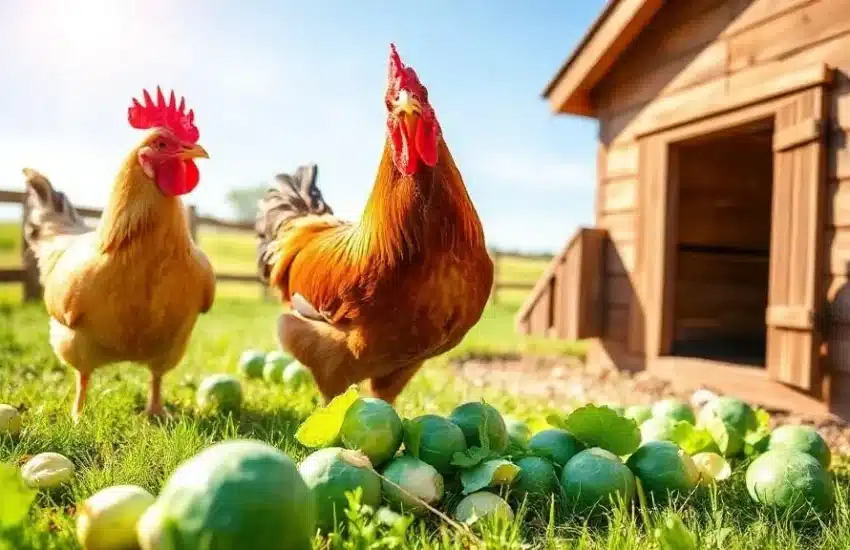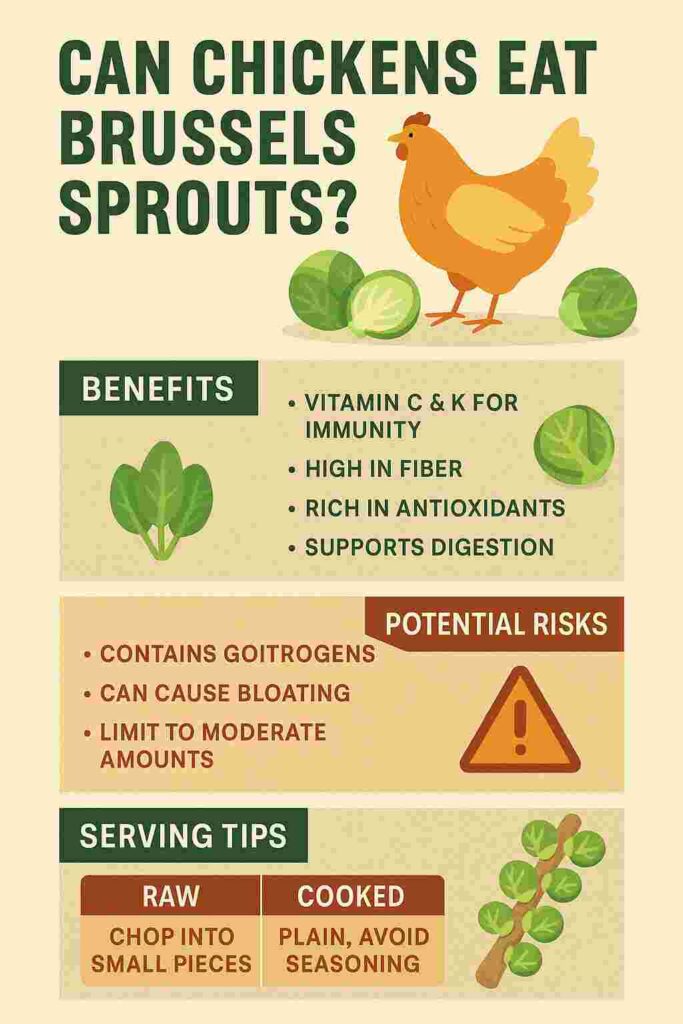Chickens can safely eat Brussels sprouts—raw, cooked, whole, chopped, stalks, and even leaves! They’re packed with essential nutrients like Vitamin C, K, A, and fiber, which support immunity, digestion, and egg health. However, too many sprouts can introduce goitrogens, compounds that may affect thyroid function. Also, Brussels sprouts should be served plain, chopped, and in moderation. Curious about other veggies like broccoli, asparagus, or carrots? We’ll explore that, too!
Can Chickens Eat Brussels Sprouts?
Yes, chickens can eat Brussels sprouts and even enjoy them as a nutritious snack. They are part of the cruciferous vegetable family—alongside broccoli, cauliflower, cabbage, and kale—all of which offer unique benefits for poultry diets.
Nutritional Highlights of Brussels Sprouts for Chickens:
-
Vitamin C & K: Boost immunity and aid calcium absorption
-
Vitamin A & Folate: Enhance eye health, reproduction, and egg viability
-
Antioxidants: Help reduce inflammation and disease risk
-
Fiber: Supports healthy digestion and gut flora
-
Protein (Trace Amounts): Helps with feather and muscle development
Why Brussels Sprouts Are Good for Chickens
Here’s why you might consider adding these “mini cabbages” to your flock’s rotation:
| Nutrient | Benefits for Chickens |
|---|---|
| Vitamin K | Improves eggshell quality, helps blood clotting |
| Vitamin C | Supports immune system |
| Folate | Essential for reproductive health |
| Manganese | Supports metabolism and bone health |
| Fiber | Aids digestion and nutrient absorption |
Potential Risks of Feeding Chickens Brussels Sprouts
While healthy in small doses, overfeeding Brussels sprouts can cause issues:
-
Goitrogens: Naturally occurring in cruciferous vegetables, these can affect thyroid function and potentially lead to avian goiter (especially if your birds are already eating soy-based feeds).
-
Gas and Bloating: Excess fiber may cause gastrointestinal discomfort.
-
Imbalanced Nutrition: Too many treats can dilute their balanced diet from formulated feeds.
Note: Not FDA-approved as a regulated poultry feed. Always consult a vet if unsure.
How to Feed Brussels Sprouts to Chickens (Raw vs. Cooked)
Raw Brussels Sprouts
-
Safe to feed but should be chopped into small pieces.
-
Chickens love pecking at shredded outer leaves.
-
Retains most nutrients.
Cooked Brussels Sprouts
-
Easier to digest—especially for younger birds or older hens.
-
Must be unseasoned — skip the salt, butter, or oil.
-
Can serve steamed or roasted (cool before feeding).
| Feeding Method | Pros | Cons |
|---|---|---|
| Raw | High nutrient retention | Tough texture if not chopped |
| Cooked | Easier to digest, softer | Slight nutrient loss |
Can Chickens Eat Brussels Sprout Leaves, Stalks & Cores?
Yes! Chickens can eat all parts of the Brussels sprouts plant:
-
Leaves: Rich in fiber and Vitamin K.
-
Stalks/Cores: Tough but edible—best chopped.
-
Outer Wrinkled Layers: Chickens often enjoy these the most.
Related: Can chickens eat cabbage or broccoli? Absolutely! These are part of the same plant family.
What About Ducks? Can Ducks Eat Brussels Sprouts?
Yes, ducks can also enjoy Brussels sprouts in moderation. Just like chickens:
-
Chop raw veggies finely or steam them.
-
Avoid feeding moldy or overly fibrous leftovers.
-
Ensure they have grit or access to pebbles for digestion.
Other Cruciferous Veggies: Safe or Not?
Wondering what other vegetables your chickens can safely enjoy? Here’s a quick overview:
| Vegetable | Can Chickens Eat It? | Notes |
|---|---|---|
| Broccoli | ✅ Yes | Rich in Vitamin C and fiber, serve raw or cooked |
| Cauliflower | ✅ Yes | Great antioxidant and Vitamin B6 source |
| Cabbage | ✅ Yes | Hang for enrichment; red cabbage is higher in Vitamin C |
| Asparagus | ✅ Yes | Supports yolk color and egg quality |
| Carrots | ✅ Yes | Supports eyesight and immune system |
| Tomatoes | ✅ Yes (only fruit) | Avoid stems and leaves (toxic) |
| Celery | ✅ Yes | Cut into small pieces; strings can be hard to digest |
Avoid: Raw beans, green potato peels, chocolate, moldy foods
Sample Meal Mix: Homemade Veggie Treat Bowl
Here’s how to make a nutritious treat bowl:
Ingredients:
-
½ cup shredded Brussels sprouts (raw or steamed)
-
¼ cup chopped carrots
-
¼ cup diced tomatoes
-
1 tbsp chopped celery
-
Optional: tablespoon of oats or sunflower seeds for enrichment
Mix together and serve fresh. Add grit access nearby.
Buying & Storing Brussels Sprouts for Chickens
-
Fresh is best. Avoid frozen sprouts with additives.
-
Inspect for rot or mold. Discard questionable spots.
-
Chop before feeding. Or pulse in a food processor for uniform size.
Pro tip: Leftover holiday Brussels? Use them up as a treat!
Who Should Feed Their Chickens Brussels Sprouts?
Best For:
-
Laying hens needing a Vitamin K boost.
-
Backyard chickens needing variety or enrichment.
-
Mixed flocks with ducks, turkeys, or geese (with same precautions).
Not Ideal For:
-
Birds already on soy-based feed (watch for goitrogen overload).
-
Birds with suspected thyroid issues (consult a vet first).
-
Flocks prone to bloat or digestive problems.
How Often Should Chickens Eat Brussels Sprouts?
-
1–2 times per week is ideal.
-
Should make up less than 10% of the total diet.
-
Always serve alongside balanced layer feed.
FAQs: Breeders Also Ask
Can chickens eat Brussels sprouts raw?
Yes. Raw sprouts are nutrient-dense but should be chopped to avoid choking or frustration.
What vegetables are not good for chickens?
Avoid onions, garlic, raw beans, rhubarb leaves, green potato peels, avocado skin/pits, and chocolate.
Can birds eat cooked Brussels sprouts?
Yes. Cooked Brussels sprouts are safe for birds, including chickens and ducks, as long as they’re plain and unseasoned.
What food do chickens go crazy for?
Black soldier fly grubs, sunflower seeds, watermelon, scrambled eggs, and cooked rice are favorites.
Final Verdict: Are Brussels Sprouts Good for Chickens?
Brussels sprouts are a safe, nutritious, and enriching treat for chickens when fed in moderation. They offer significant health benefits, especially for immunity and egg quality. However, due to goitrogen risks and potential digestive upset, they should complement—not replace—your chicken’s primary feed.
🐓 Bottom line: A few sprouts a week = happy, healthy hens.


